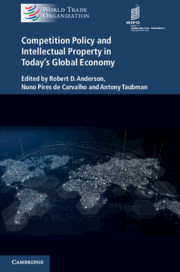Book contents
- Frontmatter
- Contents
- Tables
- Figures
- Boxes
- Contributors
- Preface
- Editorial Note
- 1 Introduction: Towards a Fresh Contribution to a Critical Policy Dialogue
- Part I Setting the Scene: Evolution of Key Principles and International Dialogue
- Part II Sharpening the Focus: Sectoral Perspectives
- Part III Deepening the Dialogue: Comparative and Jurisdictional Analyses
- Part IV Drawing the Lessons: Towards International Policy Coherence
- Index
3 - The WTO TRIPS Agreement as a Platform for Application of Competition Policy to the Contemporary Knowledge Economy
from Part I - Setting the Scene: Evolution of Key Principles and International Dialogue
Published online by Cambridge University Press: 04 June 2021
- Frontmatter
- Contents
- Tables
- Figures
- Boxes
- Contributors
- Preface
- Editorial Note
- 1 Introduction: Towards a Fresh Contribution to a Critical Policy Dialogue
- Part I Setting the Scene: Evolution of Key Principles and International Dialogue
- Part II Sharpening the Focus: Sectoral Perspectives
- Part III Deepening the Dialogue: Comparative and Jurisdictional Analyses
- Part IV Drawing the Lessons: Towards International Policy Coherence
- Index
Summary
The conclusion and subsequent implementation of the World Trade Organization (WTO) Agreement on Trade-Related Aspects of Intellectual Property Rights (‘TRIPS Agreement’ or ‘Agreement’) represented a pivotal development in the international codification of the relationship between the intellectual property (IP) system, on the one hand, and the principles of competition policy and their practical application, on the other. The Agreement articulates broad principles that apply in establishing a welfare-enhancing ‘balance’ of rights and obligations, and in marking out the scope for the implementation of domestic remedies against the anti-competitive abuse of IP rights that unreasonably restrain trade or adversely affect the international transfer of technology. More precisely, it expressly acknowledges that certain IP licensing practices or conditions may adversely affect trade and impede the transfer and dissemination of technology and sets out scope for the appropriate implementation of domestic remedies against these practices, while citing illustrative examples. And it establishes obligations for cross-border cooperation in addressing anti-competitive IP licensing practices. These provisions have received comparatively little attention on the part of practitioners, and WTO members have not systematically reviewed their implementation. Even so, they provide a unique multilateral legal framework for the application of competition law and policy in this area.
- Type
- Chapter
- Information
- Publisher: Cambridge University PressPrint publication year: 2021

